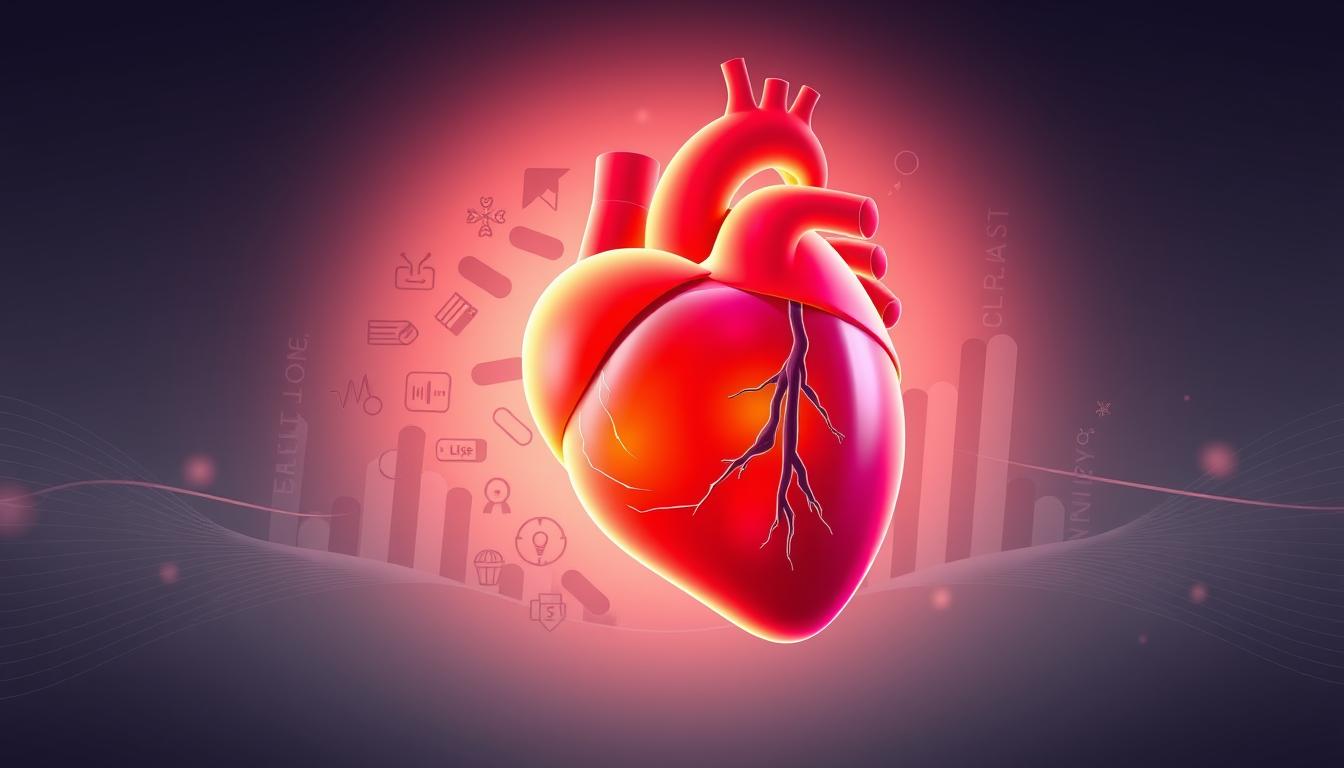New studies show a big link between anti-obesity drugs and heart health. This changes how we think about fighting obesity and heart disease. These GLP-1 therapies do more than just help you lose weight1.
These drugs are changing how we treat heart problems. They can really help lower heart risks. They even change how the heart works, giving hope to those with obesity-related heart issues2.
Recent studies show GLP-1 therapies can make the heart healthier. They can make the heart smaller and reduce fat around it. This is good news for people with obesity and heart problems1.
Key Takeaways
- Anti-obesity medications offer significant cardiovascular benefits beyond weight loss
- GLP-1 therapies show potential in reducing heart-related risks
- Innovative treatments can improve heart structure and function
- Personalized medical approaches are crucial in managing obesity and heart health
- Ongoing research continues to reveal new insights into cardiovascular treatment
Understanding GLP-1 Based Therapies and Cardiovascular Health
GLP-1 based therapies are a new way to fight obesity and boost heart health. These medicines are a big step forward in tackling weight-related health issues and lowering heart disease risks3.
How GLP-1 Medications Work in the Body
GLP-1 receptor agonists act like natural incretin hormones in our bodies. They help control insulin and hunger4. These medicines have a short life span, which has led to better versions4.
Types of FDA-Approved Anti-Obesity Medications
- Semaglutide (injectable and oral formulations)
- Liraglutide
- Dulaglutide
- Exenatide
These FDA-approved drugs are great for managing weight and protecting the heart3.
Primary Benefits Beyond Weight Loss
| Cardiovascular Benefit | Statistical Impact |
|---|---|
| Blood Pressure Reduction | 1-5 mm Hg decrease |
| Triglyceride Reduction | 0.2-0.3 mmol/L decrease |
| Cardiovascular Event Risk | Significant reduction in major adverse cardiac events |
Studies show GLP-1 therapies are great for heart health. They help with weight and protect against heart disease34.
People with type 2 diabetes can really benefit from these medicines. They may see a drop in heart disease deaths and better health4.
Latest Research Findings on Anti-Obesity Medications
Recent studies have shown exciting results about how anti-obesity drugs affect heart health. In the U.S., over 40% of adults are obese. This makes the findings very important for keeping people healthy5. Scientists found that these drugs can help patients more than just losing weight5.
- People taking these drugs lose 3% to 12% more weight than usual methods5
- More than 50% of those taking the drugs lose 10% or more of their weight5
- Weight loss of 5% to 10% can improve blood pressure and other health markers5
New studies have shown great benefits for heart health. In the SUMMIT trial, tirzepatide treatment led to less heart muscle and fat around the heart6. The SELECT trial looked at how these drugs work in different people6.
The potential of anti-obesity medications extends far beyond simple weight reduction, offering promising cardiovascular protection.
The FDA has approved six drugs for long-term obesity treatment. This shows how important these drugs are for health5. Ongoing research continues to explore the intricate relationships between weight management and cardiovascular outcomes.
Tirzepatide’s Impact on Heart Structure and Function
Studies show tirzepatide has big benefits for the heart, especially for those with obesity and heart issues. It looks promising for improving heart health7.
Analyzing Left Ventricular Mass Changes
The SUMMIT trial gave us important insights into tirzepatide’s heart effects. It showed that tirzepatide can change left ventricular mass, which is key for heart health7.
- Decreased left ventricular mass by about 11 grams
- Reduced paracardial adipose tissue by 45 milliliters
- Shows potential for protecting the heart
Epicardial Adipose Tissue Transformation
Tirzepatide has made a big impact on research about the heart. It has shown great promise in changing the fat around the heart7.
| Cardiovascular Metric | Tirzepatide Result | Clinical Significance |
|---|---|---|
| Body Weight Reduction | -11.6% | Significant cardiac health improvement |
| 6-Minute Walk Distance | +18.3 meters | Enhanced physical performance |
| C-Reactive Protein | -37.2% | Reduced inflammation markers |
SUMMIT Trial Results
The SUMMIT trial gave us a lot of evidence about tirzepatide’s heart benefits. With 731 patients, it showed big improvements in health7.
The trial showed tirzepatide could change how we manage heart health for obese patients.
It found a 10.4% drop in troponin T levels and a 6.9-point boost in the Kansas City Cardiomyopathy Questionnaire Clinical Summary Score7.
Semaglutide’s Role in Post-Cardiac Surgery Outcomes
Patients after cardiac bypass surgery face big challenges. They need special care. Semaglutide is a new hope for those with heart problems8.

The SELECT trial showed semaglutide’s power for heart health. It found:
For those who had bypass surgery, semaglutide made a big difference. It helped a lot in:
Studies showed semaglutide protects the heart well. Women got even better results, with fewer heart problems8.
This medicine does more than just treat symptoms. It tackles heart health in many ways. It helps manage risks and improves life after surgery.
The Cardiovascular Benefits of Anti-Obesity Medications: What You Need to Know
Obesity is a big health problem worldwide, affecting over 1 billion people. It raises the risk of heart problems9. It’s important to understand how weight and heart health are linked to find good treatments.
Clinical Evidence and Research Data
New studies show anti-obesity drugs can help the heart. Losing 10% of body weight can cut heart risks by 20%10. These findings suggest that certain medicines could be very helpful:
- GLP-1 receptor agonists can lower heart risks by 13-26%10
- Liraglutide can improve blood pressure9
- Some treatments can also make lipid profiles better
Patient Selection Criteria
Choosing the right patients is key for good results. Doctors should look at:
- Body mass index (BMI)
- Heart risk factors
- Metabolic tests
- How well the patient can take the medicine
Safety Considerations
Anti-obesity drugs have big benefits but need careful watching. They can cause heart rate increases and metabolic changes9. Doctors must check patients closely and keep an eye on heart health during treatment.
Personalized medical approaches remain paramount in managing obesity-related cardiovascular risks.
Weight Loss and Cardiac Biomarker Changes
Learning about the link between weight loss and heart health is vital. The LookAHEAD trial showed how lifestyle changes affect heart health markers11.

Studies found that losing weight can greatly change heart health markers. The trial focused on two key markers:
- High-sensitivity cardiac troponin T (hs-cTnT)
- N-terminal pro-B-type natriuretic peptide (NT-proBNP)
For people with Type 2 diabetes, these changes are crucial. An intense lifestyle change led to:
Weight loss can greatly improve heart health. Adults with obesity are at higher risk for heart disease12. With the right strategies, patients can lower these risks by managing their weight and heart biomarkers.
Understanding cardiac biomarkers is key to assessing and managing cardiovascular risk in patients with obesity.
Now, guidelines stress the role of weight loss in reducing heart failure risk. Patients who lose at least 5% of their weight in three months can see their efforts as successful13.
Special Considerations for Diabetes Patients
Diabetes patients need a special way to take care of their heart health. Anti-obesity drugs are key in fighting metabolic problems14. They face heart risks that need careful watching and a team approach to care.
Doctors must pick treatments that help with both diabetes and heart health. There are important things to think about for diabetes patients:
- Only 2.3% of eligible adults get weight-loss meds14
- Medicines vary by patient needs and health status
- It’s vital to assess risks for a tailored plan
Monitoring Cardiac Risk Factors
Managing diabetes means keeping an eye on heart risks. Doctors should watch:
- Blood pressure changes
- Lipid profile shifts
- Heart rate changes
- Glycemic control markers
Combined Treatment Approaches
New treatments mix things up for diabetes patients. Studies show these combos can boost heart health15:
| Medication | Cardiovascular Benefits | Diabetes Management Impact |
|---|---|---|
| SGLT2 Inhibitors | Lowered CV death risk | Better blood sugar control |
| GLP-1 Receptor Agonists | Less MI risk | Helps with weight |
| Metformin | Better lipid profile | First-line diabetes treatment |
Customized treatments can lead to better heart health for diabetes patients16.
Future Developments in Anti-Obesity Medications
The world of anti-obesity drugs is changing fast. New treatments are being developed to help with heart health. Scientists are looking into new ways to tackle obesity’s many problems17.
About 40% of U.S. adults are obese. This has led to a lot of research for better treatments17.
The research pipeline is working on several important areas:
- Advanced GLP-1/GIP receptor agonists like tirzepatide show great weight loss results18
- New oral drugs that work better and have fewer side effects18
- Therapies that target several metabolic pathways at once
New treatments are showing great results. Tirzepatide, for example, has led to up to 22.5% weight loss in studies. This is a big step forward in fighting obesity18. Orforglipron and danuglipron are also promising new oral drugs that could change how we treat obesity18.
These new treatments aim to do more than just help with weight. They also aim to lower heart disease risks. With heart disease expected to affect 61% of U.S. adults soon, these treatments offer hope for better health17.
Scientists are also looking into personalized medicine. They want to tailor treatments based on each person’s metabolism and genes. This could make treatments even more effective in the fight against obesity and heart disease.
The Role of Lifestyle Interventions in Conjunction with Medications
Dealing with obesity is more than just taking medicine. Lifestyle changes are key to lasting weight loss and better heart health. By adding lifestyle changes to medication, patients can see better results19.
- Regular physical activity19
- Nutritional counseling
- Behavioral modification strategies
- Consistent medical monitoring
For those on obesity meds, doctors suggest moderate-to-vigorous intensity activities. They recommend 200 to 300 minutes of exercise each week for the best results19. This includes 150 minutes of aerobic activity and two muscle-strengthening days a week for big health gains19.
| Intervention Type | Potential Weight Loss | Additional Benefits |
|---|---|---|
| Lifestyle Modification | 5-10% body weight | Improved metabolic health |
| Medication + Lifestyle | 15-20% body weight | Enhanced cardiovascular outcomes |
What you eat matters a lot too. The Mediterranean diet, for example, lowers heart disease risk and boosts health19. Getting regular advice from specialists keeps you motivated and helps you lose weight for good19.
Successful weight management requires a holistic approach that combines medical intervention with personalized lifestyle strategies.
It’s important for patients to team up with doctors to create a treatment plan that fits their needs and goals20.
Conclusion
The world of anti-obesity medications is growing, offering hope for heart health. Scientists have made big steps in understanding how these drugs help manage obesity and protect the heart2122. With about 43% of the world’s population now obese, finding effective treatments is more urgent than ever22.
Anti-obesity drugs are key in fighting heart disease risks. Studies show they can greatly reduce serious heart problems. The goal is to make treatments safer and more effective for each patient21. New rules require thorough heart health tests to ensure safety and effectiveness21.
As science moves forward, combining drugs with healthy lifestyle choices will be the best way to fight obesity. Research keeps uncovering how weight loss and heart health are linked. Doctors and scientists are working hard to create safer, more effective drugs to improve patients’ lives22.
FAQ
What are GLP-1 based therapies and how do they impact cardiovascular health?
Which anti-obesity medications are currently FDA-approved?
How do anti-obesity medications benefit patients with cardiovascular disease?
What are the key findings from the SUMMIT trial with tirzepatide?
Are these medications safe for patients with diabetes?
What lifestyle changes complement anti-obesity medications?
How do weight loss medications affect cardiac biomarkers?
What future developments are expected in anti-obesity medications?
Can these medications completely replace traditional cardiovascular treatments?
How quickly can patients expect to see cardiovascular improvements?
Source Links
- Anti-Obesity Drugs, Lifestyle Interventions Show Cardiovascular Benefits Beyond Weight Loss – American College of Cardiology – https://www.acc.org/About-ACC/Press-Releases/2024/11/18/19/45/Anti-Obesity-Drugs-Lifestyle-Interventions-Show-Cardiovascular-Benefits-Beyond-Weight-Loss
- Anti-Obesity Drugs, Lifestyle Interventions Show CV Benefits Beyond Weight Loss – American College of Cardiology – https://www.acc.org/latest-in-cardiology/articles/2024/11/13/21/17/mon-anti-obesity-drugs-aha-2024
- Effect of GLP-1 receptor agonists on weight and cardiovascular outcomes: A review – https://pmc.ncbi.nlm.nih.gov/articles/PMC11537668/
- Mechanism of cardiovascular disease benefit of glucagon-like peptide 1 agonists – https://pmc.ncbi.nlm.nih.gov/articles/PMC6739887/
- Prescription Medications to Treat Overweight & Obesity – NIDDK – https://www.niddk.nih.gov/health-information/weight-management/prescription-medications-treat-overweight-obesity
- Anti-obesity drugs show promise in improving cardiovascular health beyond weight loss – https://www.news-medical.net/news/20241119/Anti-obesity-drugs-show-promise-in-improving-cardiovascular-health-beyond-weight-loss.aspx
- Effects of tirzepatide on circulatory overload and end-organ damage in heart failure with preserved ejection fraction and obesity: a secondary analysis of the SUMMIT trial – https://pmc.ncbi.nlm.nih.gov/articles/PMC11835708/
- New Science Suggests Semaglutide Improves CV Outcomes Beyond Weight Loss – American College of Cardiology – https://www.acc.org/Latest-in-Cardiology/Articles/2024/08/28/19/41/fri-435am-new-science-esc-2024
- Cardiovascular Risks and Benefits of Medications Used for Weight Loss – https://pmc.ncbi.nlm.nih.gov/articles/PMC6974445/
- Anti-obesity therapy for cardiovascular disease prevention: potential expected roles of glucagon-like peptide-1 receptor agonists – https://pmc.ncbi.nlm.nih.gov/articles/PMC9450447/
- Injectable anti-obesity drugs shown to benefit heart health – https://newatlas.com/heart-disease/glp-1-obesity-cardiovascular-health/
- The risk of cardiovascular complications with current obesity drugs – https://pmc.ncbi.nlm.nih.gov/articles/PMC7554173/
- Obesity Plus Heart Failure: What Are Safe and Effective Weight Loss Strategies? – https://consultqd.clevelandclinic.org/obesity-plus-heart-failure-what-are-safe-and-effective-weight-loss-strategies
- Medications for Type 2 diabetes, weight loss & kidney health not always provided as needed – https://newsroom.heart.org/news/medications-for-type-2-diabetes-weight-loss-kidney-health-not-always-provided-as-needed
- Frontiers | Cardiovascular Risks and Benefits of Medications Used for Weight Loss – https://www.frontiersin.org/journals/endocrinology/articles/10.3389/fendo.2019.00883/full
- Next Generation of Weight Management Medications: Implications for Diabetes and CVD Risk – https://pmc.ncbi.nlm.nih.gov/articles/PMC4408373/
- Prevention, life-saving therapies, anti-obesity meds top 2024 heart, stroke research news – https://newsroom.heart.org/news/prevention-life-saving-therapies-anti-obesity-meds-top-2024-heart-stroke-research-news
- What is the pipeline for future medications for obesity? – International Journal of Obesity – https://www.nature.com/articles/s41366-024-01473-y
- The Benefit of Healthy Lifestyle in the Era of New Medications to Treat Obesity – https://pmc.ncbi.nlm.nih.gov/articles/PMC10798050/
- The Role of Lifestyle Modification with Second-Generation Anti-obesity Medications: Comparisons, Questions, and Clinical Opportunities – https://pmc.ncbi.nlm.nih.gov/articles/PMC10748770/
- Cardiovascular Safety and Superiority of Anti-Obesity Medications – https://pmc.ncbi.nlm.nih.gov/articles/PMC8286099/
- Obesity Medications and Their Impact on Cardiovascular Health: A Narrative Review – https://pmc.ncbi.nlm.nih.gov/articles/PMC11573306/




